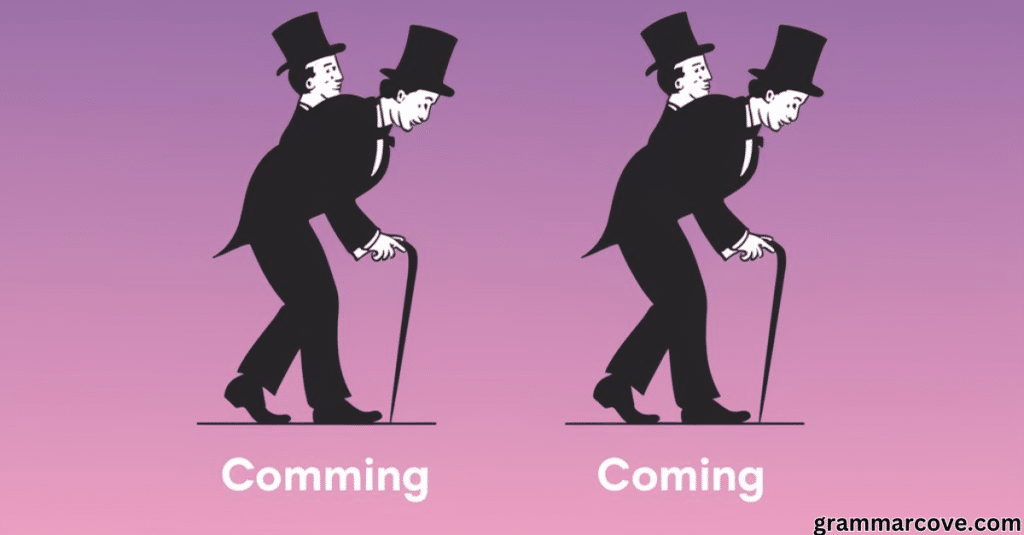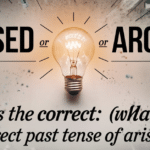The English language is filled with quirks and oddities that can trip up even the most seasoned writers. One of the most frequent stumbling blocks involves spelling mistakes, especially when it comes to words that seem straightforward but have hidden rules. One such example is deciding between “comming” and “coming.” If you’ve ever wondered which one is correct and why, this article will clear things up for you. We’ll explore the rules behind the proper spelling, understand the causes of common errors, and provide scenario examples to show how each form might mistakenly appear.
Understanding the Difference: “Comming” vs. “Coming”
The confusion between “comming” and “coming” often arises due to English spelling rules involving consonants and vowels. The correct form, however, is “coming.” When a verb ends in a silent “e” (like “come”), you generally drop the “e” before adding “-ing” to create the present participle. This transforms “come” into “coming” rather than “comming.”
Why “Comming” Is Incorrect
It’s important to know that “comming” is not an accepted spelling in the English language. The reason for this is tied to the rule of doubling consonants. Typically, doubling a consonant happens when a verb ends in a single vowel followed by a consonant. In the word “come,” there is a silent “e” at the end, making the consonant-doubling rule inapplicable here.
Scenario Example: The Incorrect Use of “Comming”
Imagine you’re sending a work email to a colleague.
Subject: Update on the Upcoming Presentation
Hi John,Just wanted to check in about the slides you’re preparing. Is everything comming together as planned?
Let me know if you need any help.
Best,
Sarah
Here, “comming” is a misspelling of “coming.” The correct sentence should be: “Is everything coming together as planned?”
The Correct Use: “Coming”
Now, let’s delve into why “coming” is the right choice. In English, verbs ending in silent “e” lose that “e” when adding “-ing.” The silent “e” rule simplifies the pronunciation and makes the word flow more naturally in speech and writing. This is a crucial aspect of accurate communication, especially in professional settings where spelling errors can undermine your message.
Scenario Example: The Correct Use of “Coming”
Consider another email where the word is used correctly:
Subject: Follow-Up on the Project
Hi Lisa,I just wanted to confirm that the revised proposal is coming along well. The client is expecting it by Friday.
Let me know if you encounter any issues.
Regards,
Mark
In this instance, “coming” is correctly spelled, ensuring that the message appears professional and the meaning is clear.
Why Do We Make This Mistake?
Spelling errors like “comming” occur because English spelling rules are not always intuitive. It’s easy to assume that because many other words follow the pattern of doubling consonants, this word should too. Additionally, people often overlook silent letters, leading to spelling mistakes.
The Silent “E” Rule
Understanding the silent “e” rule is essential for mastering English spelling. This rule states that when adding a suffix like “-ing” to a verb ending in a silent “e,” the “e” is dropped. Here are some examples to illustrate:
- Make → Making
- Write → Writing
- Come → Coming
Notice how, in each case, the silent “e” is omitted before adding “-ing.” However, this doesn’t apply to every word, which is why knowing the rules matters.
Common Spelling Errors and How to Avoid Them
Now that you understand the difference between “coming” and “comming,” let’s look at other common spelling errors that follow similar patterns.
- Doubling Consonants:
Words like “running” or “beginning” double the final consonant because they end in a single vowel followed by a consonant. However, since “come” ends in a silent “e,” you don’t double the “m” when adding “-ing.” - Silent “E” Rule Exceptions:
While the silent “e” is usually dropped, there are words where this rule doesn’t apply. For example, words like “ageing” (British English) keep the “e” to preserve the soft “g” sound. - Commonly Confused Words:
It’s easy to mix up words with similar endings. Remember, words like “hopping” and “hoping” mean entirely different things due to the doubling of the consonant.
How Writing Tools Can Help

Spelling mistakes can be minimized by using writing tools such as Grammarly and ProWritingAid. These tools automatically detect errors like “comming” and suggest the correct form, “coming.” They are helpful for catching mistakes in emails, documents, or any written content.
- Grammarly: This tool provides real-time grammar and spelling suggestions, catching errors and offering corrections.
- ProWritingAid: Besides spelling, ProWritingAid checks for grammar, style, and effective writing techniques, making it a comprehensive tool for anyone looking to improve their writing.
Examples of “Coming” in Different Contexts
Using “coming” in various scenarios can help solidify its correct usage. Here are some examples:
In a Business Email:
Subject: Upcoming Coaching Seminar
Hi Team,I’m excited to share that the annual coaching seminar is coming up next month. This event will focus on coaching techniques, player development, and team dynamics.
Best regards,
Angela
In a Motivational Speech:
“The future is full of opportunities, and I see many great things coming our way. With our dedication to teamwork, we’ll continue to achieve new milestones.”
Frequently Asked Questions
To further clarify the topic, let’s look at some frequently asked questions:
Q1: Why is “coming” the correct form?
“Coming” follows the English spelling rule where you drop the silent “e” before adding the suffix “-ing.” The alternative, “comming,” does not adhere to any standard spelling rules and is considered incorrect.
Q2: What are some other words that follow the same pattern?
Words like “baking,” “riding,” and “writing” also drop the silent “e” when adding the “-ing” suffix. Learning these examples can help you avoid similar mistakes.
Q3: Can spell-check tools like Grammarly catch this mistake?
Yes, writing tools like Grammarly and ProWritingAid can quickly identify spelling mistakes like “comming” and offer the correct spelling, “coming.”
The Role of Proper Spelling in Effective Writing
Why does accurate communication matter so much, especially in a professional setting? Misspellings can distract your reader or cause confusion, diminishing the impact of your message. Correctly using words like “coming” shows attention to detail, which is crucial for team performance and professional success.
Avoiding the “Comming” Trap: Tips for Writers
Here are some strategies to help you steer clear of the “comming” mistake:
- Practice Proper Spelling Rules Regularly: Make a habit of reviewing common spelling rules, such as those involving silent letters and doubling consonants.
- Use Writing Tools: Tools like Grammarly can catch errors before you send an important email or publish an article.
- Proofread Your Work: Take the time to read through your writing carefully. Reading it out loud can help catch mistakes that you might otherwise overlook.
- Learn from Mistakes: If you notice yourself frequently making the same errors, take note and focus on correcting them in the future.
Why Spelling Errors Matter in Professional Settings
Spelling mistakes like “comming” can affect your credibility, especially if you’re sending emails or presenting materials to clients or colleagues. It reflects on your dedication to effective communication and can influence how your message is perceived.
The Importance of Learning Proper Spelling
Mastering spelling rules can make a significant difference in your writing quality. It shows that you care about accurate communication and understand the nuances of the English language. This is particularly important when discussing specialized topics like coaching techniques or team dynamics, where precise language can impact the clarity and persuasiveness of your message.
Wrapping It Up
In the debate between “comming” and “coming,” there’s a clear winner: “coming.” Understanding why “comming” is incorrect helps avoid common pitfalls and improve your writing skills. Always remember the silent “e” rule and practice proper spelling rules to ensure your writing is polished and professional. Whether you’re writing an email, preparing a motivational speech, or crafting an article, paying attention to spelling can make all the difference.
By taking advantage of writing tools like Grammarly and ProWritingAid, proofreading your work, and keeping spelling mistakes in check, you can master English spelling and elevate your writing skills.
I hope this article clears up any confusion around “comming” and “coming.” Feel free to share your thoughts or ask questions below. Let’s continue learning together!

Steel Morgan is an experienced blogger passionate about language and writing. On Grammarcove. he shares his expertise in grammar, punctuation, and effective communication, making complex rules simple and accessible for readers. With a knack for clear explanations and engaging content, Steel aims to help others master the art of language.







